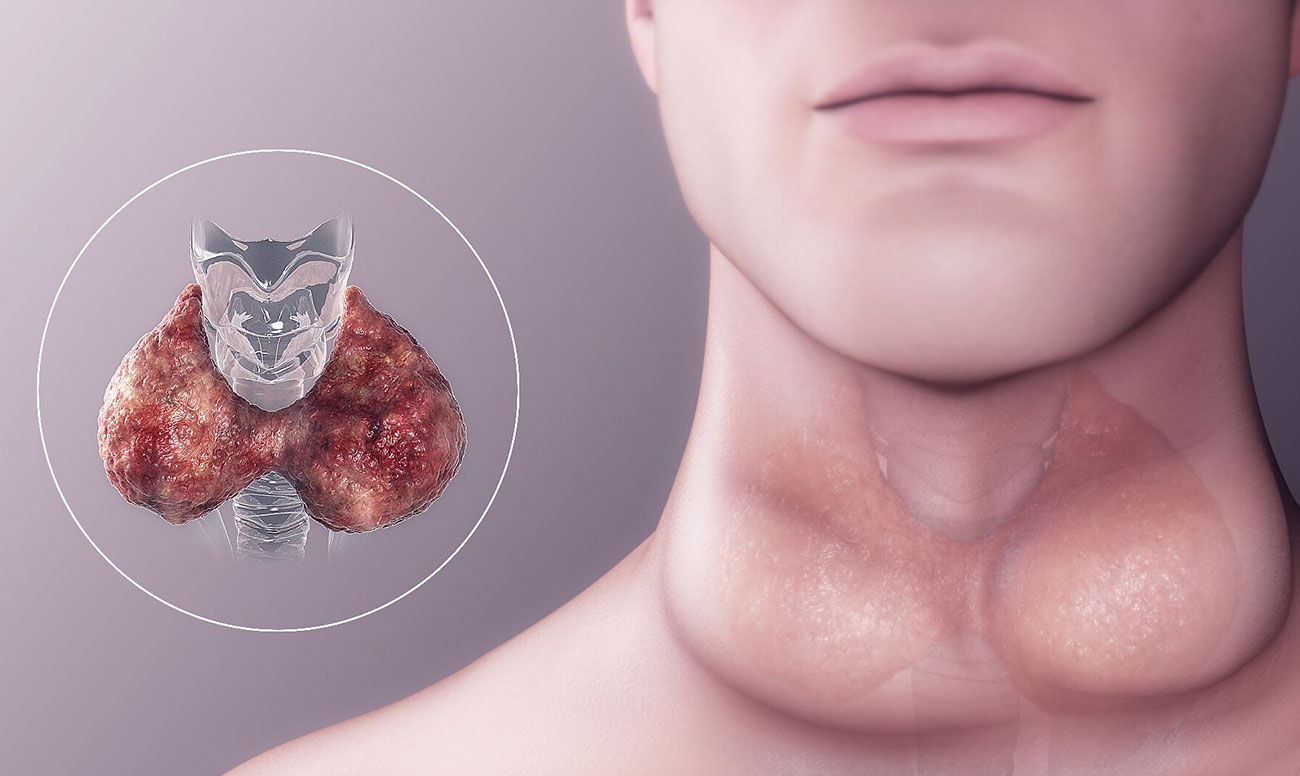
THYROID DISEASES AND ITS SURGERY
THYROID GLAND
The structure of the thyroid gland in general
The thyroid gland is an endocrine organ in the form of a butterfly, located directly in front of the main respiratory tract (Trakea) in the neck. The average weight of an adult healthy person is 20 grams; the average length is 4 cm, and the average thickness is 2.5 cm.
This organ can grow up to a weight of several hundred grams or enlarge itself in various diseases. Here’s the growth of the thyroid gland for a variety of reasons, in a general term, we call it GOITRE.
Another feature of the organ is that it is the most bloody organ per gram in our body. On average, 5 ml of blood passes through 1 gram of tissue per minute. This amount is about 2-3 ml for the kidney. In some diseases, whether or not Goitre, the thyroid gland is overworked and the bleeding increases dramatically. For example, in a toxic goitre species called Graves’ disease, the blood flow can exceed 1 litre per minute. If we consider the average volume of blood circulating in the body to be 5 litres, we can see how high that amount is.
The thyroid gland is closely adjacent to the esophagus, voice nerves called the inferior laryngeal (recurrent nerve) and superior laryngeal nerve, the parathyroid glands and the main vessels of the neck.
Depanding on metabolic needs of the tissues in the body, the thyroid gland produces hormones called triiodothyronine (T3) and tetrahydothyronin (T4) and calcitonin. The structure of T3 and T4 hormones contains iodine atoms, and these hormones cannot be produced if they are insufficiently absorbed. In this case, an increase in the amount of TSH, which controls the function of the thyroid gland and is a cerebral hormone (hypophysis), leads to a disease known as “Endemic goitre” in the tiroid gland, which is also affected by TSH. T3 and T4 have varying degrees of effect on all tissues in the body. It plays a critical role, especially in the period of intra-uterine growth and in childhood development. In adult individuals, these two hormones maintain a functioning metabolism and maintain a certain level of body temperature.
Actually, “endemic goitre” term used for non-neoplastic and non-inflammatory thyroid enlargements. Many mountainous areas in our country, especially in the Black Sea region, are deficient in iodine. With compulsory consumption of iodine salts, this problem is almost overcome.
Over-production of thyroid hormones (thyrotoxicosis, hyperthyroidism, thyreoid storm).) or failure to work (hypothyroidism, cretinism in children) are conditions that can cause serious problems affecting almost all systems of the body.
Complaints arising from hyperthyroidism
– weight loss despite normal or increased appetite
– intolerance to heat
– excessive sweating
– restlessness, distress, intense anxiety
– fainting, muscle weakness
– disturbances in the pattern of menstrual bleeding
– especially in the elderly, deterioration in heart rhythm, depression, perception problems
The causes of hyperthyroidism
– Graves’ disease
– Thyrotoxic period of Hashimoto’s disease, sub-acute thyroid inflammation
– Nodular toxic goitre
– Toxic adenoma
– Overdose of thyroid hormone as a drug
– Iodine-related hyperthyroidism
Some of these problems require surgery. Some can be solved without surgery with radioactive iodine therapy (RAI). For example, surgery may be required for eye growth, recurrence despite medication, or nodular Graves disease, while other forms of the disease, or toxic adenoma, can be treated with RAI.
Complaints related to hypothyroidism
– Constipation
– Cold intolerance, constant feeling of coldness
– swelling of the feet of the hands, of the eyelids
– forgetfulness, mental retardation, inclination to sleep
– prolonged menstrual bleeding
– dry skin
What are the tests for people with thyroid problems?
Thyroid function tests: These are blood tests.
TSH level (0.3-5 mIU/L). The sensitive form of this test (sensitive TSH) is a much more reliable test. In cases of hyperthyroidism, TSH levels fall below normal levels, while in hypothyroidism, they rise above normal levels.
fT3, fT4 levels, Anti-thyroglobulin and anti-microsomal antibodies (Anti-T, Anti-M): For the evaluation of some prolonged thyroiditis and autoimmune diseases (e.g. Hashimoto’s disease).
Anti TSH receptor antibody: Sometimes used for diagnosis of a type of autoimmune hyperthyroidism called Graves’s disease.
– Ultrasonography (USG): It must be done when assessing thyroid diseases.
If possible, Doppler ultrasound should be preferred by experienced doctors. It’s a matter of quality in an ultrasound, like surgery.
– Scintigraphy: Usually used for hyperthyroidism.
– Tomography (BT) or magnetic resonance imaging (MR): Preferred in cases of retrosternal extention, or to determine thyroid cancer extention to the surrounding organs.
When nodular thyroid disease or thyroid nodules require surgery?
If thyroid nodules suggest thyroid cancer (about 5-10% probability) during radiological or physical examination.
Nodules that develop in childhood, in individuals with a history of thyroid cancer in their family, for example in their siblings, or who have received radiotherapy (radiotherapy) to the neck in the past, have a higher risk of cancer.
Progression in nodul size and numbers in time.
The presence of a suspected cancer nodule in the examination or ultrasound requires surgery.
Solitary nodules, especially those with diameter greater than 3 cm, are the surgical candidates.
Nodules that compress the respiratory tract,
nodules that extend into the chest cavity, or progressively growing outward nodules,
Some forms of Graves’s disease, multiple nodules that lead to hyperthyroidism, sometimes require surgery on toxic adenoma.
What you need to know about needle biopsy
– I suggest that needle biopsy be performed under sonographic guidence, in cases of suspected cancer, in families with thyroid cancer, and especially in all nodular guatr cases larger than 1 cm.
– Personally, I would suggest that the needle biopsy be accompanied by ultrasound.
– If you are taking antiagregan drugs like aspirin, you must stop taking it at least one week before the needle biopsy. Otherwise, a dangerous bleeding can arise.
If possible, needle biopsy should be examined by an experienced pathologist.
What you need to know about Goitre surgery!
– If you have hyperthyroidism (excess hormone secretion of the thyroid gland), the hormones should be reduces to normal levels prior to surgery. Otherwise, serious problems can arise before and during surgery. On the other hand Hypothyroidism also requires pre-operative medication.
– The length of incision on the neck doesn’t reflect the quality of the surgery. In other words. Basically, the ideal surgical treatment for thyroid disease is the total removal of the affected lobes o lobes. So at least there should be no thyroid tissue left on one side. Otherwise, the disease may recur in the remaining tissue, regardless of the origin of the guatr disease. During this surgery, laringeal nerves should not be damaged and the parathyroid glands should be protected as much as possible.
– A thyroid surgery carries two significant risks of complications (as far as the surgeon’s experience is concerned): Permanent vocal kord palsy: This is a possibility even in the best hands, and occurs on average 1-3% more often. After surgery, the symptoms can be in the form of voicelessness or suffocation of speech. Sometimes it can never be understood. When this happens, it usually recovers by itself within a few months. Sometimes nerve palsy can be related to cancer in the thyroid gland. I mean, thyroid cancer may have damaged the speech nerve.
Parathyroid gland insufficiency (Hipoparathyroidism). After high-quality surgery (total thyroidectomy), it occurs very often. It can be seen in one of three or four people, even in the best hands. But most of the time it improves within a few weeks of surgery. During this period, it is necessary to use medication so that there is no trouble. The likelihood of permanent failure is around 1-3%.
– After total thyroidectomy a lifetime T4 hormone should be taken. The dosage of this medicine varies from person to person and is prescribed by the surgeon.
Types of thyroid cancer and surgical forms
Thyroid cancer has a few important features: The treatment varies significantly depending on the type of cancer. In some species, radioactive iodine therapy is quite effective.
– in most patients, cure can be achieved with appropriate surgery and subsequent treatments. So, after proper treatment, it’s much more possible to get rid of the disease completely, to lead a normal, trouble-free life. For thyroid cancer, chemotherapy is almost never used.
Types and treatments of thyroid cancer
Papillary cancer: It is the most common type (%60). Three percent of them are familial form. In these patients, partial or complete removal of the thyroid gland is enough but, sometimes regional lymph node dissection may be necessary. These patients mostly receive RAI (radioactive iodine) treatment in the post-operative period.
Folicular cancer: Approximately 20% of cases. These are treated like papillary cancer, but most patients do not need cervical disection. RAI is also very effective in this type of cancer.
Medulla cancer: has an average incidence of about 10%. Completeness of surgery is the most important element of treatment. Because RAI treatment is not effective in these patients. In addition to total thyroidectomy, cervical lymph node dissection is often required. A significant proportion of patients have family transitional forms. I mean, many people in the same family can get the disease.
Anaplastic cancer: It is a more rare but quite aggressive type.





